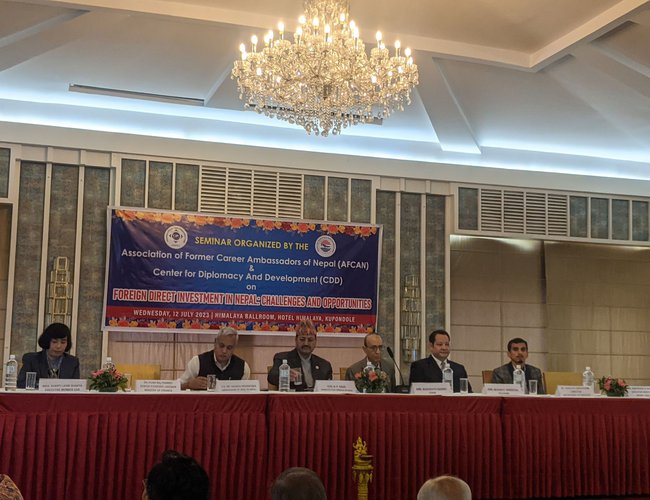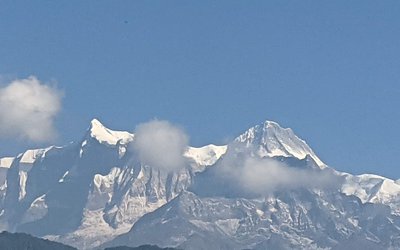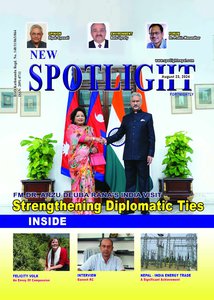
The Association of Former Career Ambassadors (AFCAN) and Center for Diplomacy and Development make efforts to promote knowledge and experience in diplomacy and other issues of topical importance to the public through various means. This seminar is also part of this effort.
It is said that for small nations, effective and proactive diplomacy is a necessity. It has proven so while we assess the current international situation. Dangers from political problems are looming in many parts of the world.
The topic of the seminar today is crucial. We will eventually hear from specialists about various areas of foreign direct investment in our nation. We are aware that FDI faces numerous obstacles in its implementation. We also have a big potential to increase FDI in our nation at the same time.
I recall that a new idea of economic diplomacy was added to the goals of our non-aligned foreign policy in 1996, while I was working in the United Nations Division of the Foreign Ministry. The six goals of this new program included promoting exports, FDI, foreign employment prospects, the development of water resources, and international help. All of these goals are very important to the process of national economic development. These are the regions that can act as the nation's growth engine in various ways. These are the sectors that have the potential to greatly increase employment and provide income for the government. As a result, it is crucial that economic diplomacy be carried out successfully. The public and commercial sectors must exert great effort to advance economic diplomacy.
One of the key goals of economic diplomacy is to increase foreign direct investment. It has been 27 years since our nation attempted to import FDI. According to the most recent data available, a total of 5,692 industries have been established with FDI, totaling an investment of 439.78 billion rupees. Over 300,000 jobs have been made possible via FDI industries.
More than 100 nations are sending FDI to Nepal. Every sector of the national economy, including manufacturing, services, tourism, and other industries, has been impacted by FDI. The government and private sector must keep up their efforts in the coming days to promote FDI in the nation. It is a process that never comes to a conclusion.
I once met Kich Uman, the ambassador of Cambodia, while residing in Paris. He had been a senior ambassador and had spent more than 11 years in France. He revealed to me during our conversation that Cambodia, which is only slightly larger than our nation and has a third of our population, draws FDI worth $8 billion annually.
With such enormous figures, he was still not content. He continued, "Excellency, we are moving forward with plans to increase FDI in our nation." It occurred to me that Cambodia, a nation wrecked by a 30-year civil war and with a less friendly environment, could accomplish so much. Why can't we, then? What issues are there? What in fact makes it difficult for FDI to grow in our nation. These logical inquiries entered my head. In truth, Nepal has a wealth of resources for development, including agriculture, biodiversity, ITC, tourism, water resources, and many others, thanks to its immense natural and human resources.
2017 saw the organization of an investment symposium at the Soaltee Hotel, which I also went to. During her address, a female representative of an international financial institution said that there are too many bureaucratic entanglements in our nation to list. She also cited Cambodia as an example, where FDI projects are swiftly authorized. The government treats foreign investors as important visitors. Therefore, in my opinion, it is imperative that our nation respect FDI as a source of capital investment, technological transfer, and superior knowledge. Let's foster a more welcoming environment for FDI imports.
I know that fewer than 1% of the world's FDI funds are directed to the South Asian region, where Nepal is located. The amount of FDI money in the global market is tremendous. To reach those, we need talent. Our FDI policies, which include non-nationalization, capital and profit repatriation, tax holidays, infrastructure facilities, an abundance of labor resources, and a pleasant climate, are on par with those of any other nation. However, in 27 years, we have not been able to bring in half the amount of FDI that Cambodia did in a single year. If we are to keep this in mind, this is a really important question.
Therefore, wouldn't it be appropriate for us to also learn from other nations that have been successful in drawing large amounts of FDI? We cannot rest on our laurels while only enacting good policies. Instead, we must take the proper steps to ensure their successful implementation. Additionally, we must encourage FDI initiatives that make use of the raw materials we already have on hand and generate jobs in rural areas.
Shrestha is a former ambassador to France and founding president of Center for Diplomacy and Development

















